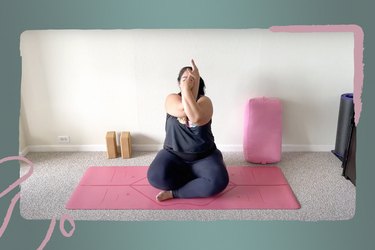
The term "burnout" has become a bit of a buzzword in work culture, but it actually has a technical definition. Burnout is defined as "a syndrome characterized by a high degree of emotional exhaustion and depersonalization (i.e., cynicism), and a low sense of personal accomplishment at work," according to the National Academy of Medicine (NAM).
The causes of burnout can vary, but the most common reason is having so much to do at work that it starts to interfere with the rest of your life.
Video of the Day
Video of the Day
One group of people who know that feeling well are those working in health care. Up to 54 percent of nurses and doctors and 60 percent of medical students and residents report symptoms of burnout, according to an October 2019 report from the NAM. And by many accounts, those numbers only grew once the COVID-19 pandemic started.
Burnout can affect anyone, no matter their profession: Nearly 80 percent of people said they experience work-related stress and symptoms of burnout in a July/August 2021 survey conducted by the American Psychological Association. Out of the 1,501 survey participants, about 3 in 5 said their stress negatively affected their work.
"You may be doing a lot of work, but you don't feel like you're getting anywhere. It can be a vicious cycle," explains Vineet Arora, MD, an internal medicine specialist at the University of Chicago who researches burnout among physicians. "It can also come from workplace mistreatment, a lack of community or moral distress."
Symptoms of burnout are physical and mental, according to the Mayo Clinic, including:
- Fatigue
- Irritability
- Difficulty concentrating
- Change in sleep habits
- Lack of satisfaction
But no matter what field you're in, you can learn something from the medical experts handling these feelings day after day. Here's how health care professionals personally cope when they're feeling burned out from work and everyday life.
1. Set Proper Boundaries
The most common reason for burnout is a work-life balance that's tilting the scales. When work seems to be taking over your entire life, it's tough to feel fulfilled when you're constantly in grind mode. That's where setting boundaries with your time and energy comes into play.
"I protect my time like a hawk, and I try to be very strategic about what I give my time to," Dr. Arora says.
A stressful day at work can quickly turn into a stressful evening at home if boundaries aren't in place. In any profession, it can be hard to say no when asked to do additional tasks or work beyond your standard work hours.
"It's easy for people to ask you to do more," says Johanna Beck, MD, a psychiatrist at Jefferson Hospital in Philadelphia.
Creating boundaries with work can look like shutting off your phone once you're off the clock or refusing to answer emails outside of work hours.
"You don't owe an explanation for why you're saying no, and it's OK to set those boundaries," Dr. Beck says.
It also helps to be intentional about making plans for things aside from work. Just like the expression "work hard, play hard" suggests, personal time should be spent doing things you enjoy.
"The main thing for me is having outside things to look forward to and ways to stay busy," says Jasmine Ross, RN, a pediatric primary care and neonatal intensive care nurse at the Children's Hospital of Philadelphia. "Having friends and social outlets is really something that helps me stay afloat," Ross says.
2. Talk It Out
Feeling overwhelmed and mentally exhausted can take a toll on professional and personal life. Keeping those feelings to yourself can potentially worsen the issue. Instead of bottling it up, try letting it out with someone you trust, or someone who can relate to what you're going through.
At Jefferson Hospital, Dr. Beck explains a built-in burnout prevention coping mechanism she and her colleagues practice.
"We have Balint groups where we meet with other physicians to discuss particular cases that may be weighing on us," Dr. Beck says. Balint groups, in which physicians meet regularly to discuss cases with the goal of improving their relationship with and care for their patients, were created by the American Balint Society, a non-profit organization that helps doctors reflect on their work.
"Every speciality has something sad they deal with, so I think all specialties would benefit from it. It feels like a safe space to debrief."
If work colleagues don't feel like an option, having honest conversations with family or friends is another way to release built-up stress. If you don't feel comfortable sharing with family and friends, it might be a sign you could benefit from talking with a professional.
It's also possible that sometimes burnout symptoms can mask themselves as depression symptoms. The differences in depression and burnout are nuanced, yet distinct.
"As a psychiatrist, I actually deal with this a lot," Dr. Beck says. "Sometimes people will come in and think they're depressed. When I go through the clinical criteria of depression they don't meet it, but what they are feeling is burnout."
When it comes to treatment, depression can be potentially resolved with medication, whereas burnout is solved by making lifestyle changes.
"People who are depressed have a lot of feelings of guilt, or they feel like a burden on others," Dr. Beck says. "People who are burned out feel like the system is a burden on them, which it is."
Related Reading
3. Get Enough Sleep
This probably won't come as a surprise, but neglecting sleep can worsen burnout. A lack of sleep can also heighten feelings of irritability, trouble concentrating and overall exhaustion. It's important to prioritize sleep at all times to remain healthy, but especially when dealing with burnout.
"If you are burned out, sleep loss will make it worse. And if you're sleep-deprived, your burnout will increase," Dr. Arora explains. "Sometimes getting a good night's sleep will help you tackle what you need to do the next day."
It sounds so simple, but sleep is typically one of the first things that starts to be neglected during a burnout phase. Try prioritizing sleep by limiting screen time at night, sticking to a bedtime routine and getting at least 6 hours of sleep.
4. Move Your Body
When you're feeling exhausted from work, exercising may seem counterintuitive. But anyone who has ever experienced the post-workout rush of endorphins known as the runner's high knows about the feel-good benefits of physical activity.
And research backs this up: According to a November 2021 study in Physiology & Behavior, moderate aerobic activity supports wellbeing and better recovery from mental exhaustion.
"As a physical therapist I make sure I am physically active, because I know I should practice what I preach," says Jessica Leung, PT, DPT.
"I like to do yoga, group exercise, lifting weights and climbing. Different activities keep it fresh and introduce new movement patterns to my body. It's something I encourage my patients to do, too."
5. Change Your Environment
"When I'm traveling I'm not thinking about work or the burnout," says Vanessa Grant, RN, an operating room nurse at Jefferson Hospital in Philadelphia. "The trip just completely takes over my mind, and it's a happy feeling."
A vacation won't solve all of your problems, but it might help temporarily. That all depends on what is causing your burnout in the first place.
"If you've reached a limit and need to recharge, then yes, take a vacation ," Dr. Arora says. "In some ways vacation can be incredibly helpful and allow you to reconnect with things you enjoy and restore exhaustion."
A change of scenery can also give you a fresh perspective, and a chance to distance yourself from work stressors. And a vacation doesn't have to be a fancy getaway, either. Time away from work can be spent in the comfort of your home (hello, staycation!) or a day of self-care.
"A lot of physicians I see who are burned out feel like they aren't able to take vacation because of the needs of the hospital," Dr. Beck says. "You shouldn't be waiting until the end of the year to take vacation. Take it when it's appropriate and take it when you need it."
- National Academy of Medicine: "Clinician Resilience and Well-Being"
- Mayo Clinic: "Job burnout: How to spot it and take action"
- Cleveland Clinic: "What is Burnout?"
- American Psychological Association: "Burnout and stress are everywhere"
- National Library of Medicine: "Reducing workplace burnout: the relative benefits of cardiovascular and resistance exercise"
- National Academies of Medicine: "Taking Action Against Clinician Burnout: A Systems Approach to Professional Well-Being"
- Physiology and Behavior: "Acute aerobic exercise to recover from mental exhaustion - a randomized controlled trial"
Is this an emergency? If you are experiencing serious medical symptoms, please see the National Library of Medicine’s list of signs you need emergency medical attention or call 911.









